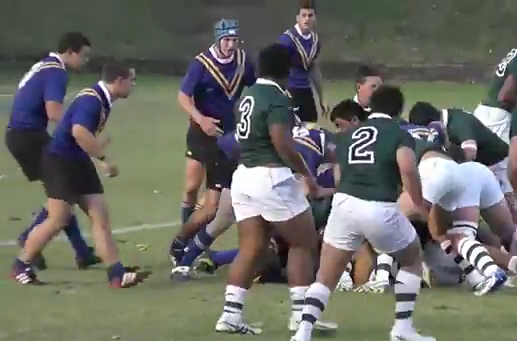If you’re old enough, you’ll remember the frustration of watching the Wallabies in the early 1980s. The Wallabies had a dream backline (Carson or Cox at half, Mark Ella, Hawker and O’Connor in the centres, Moon and maybe Grigg on the wings, Roger Gould at full back). They actually didn’t play together all that much, but they were good enough to take apart anyone in the world. If they got the ball in their hands.
And that was where the frustration came in, because although the back row was always good (Poidevin, Loane, Shaw, Cornelson) the tight five was often outmuscled by its bigger opponents who were more efficient at the set piece. I still have nightmares about the 1981-82 tour, when Australia even put Tony Shaw (who these days would be too short to play hooker) into the second row, to jump in lineouts against men six or seven inches taller than he was.
Anyway, I’ve never been a Waverley supporter and find it hard to empathise with them too much, but my guess is that Wave fans will have the same thoughts this season as Wallabies fans did back in that time.
There’s no doubt that Waverley has a talented backline. In seven competition rounds, Waverley has run in (on my count) 32 tries, more than any other team. Their 220 points is more than anyone else has scored (unbeaten Barker has 166, Trinity 163).
Waverley is the only team to have run up fifty points in a match this season, and has done it twice (69-31 over Knox, 50-7 over Cranbrook). There’s a slick scrum-half in Jack Whitaker, O’Donnell is a fly-half with good hands and fast feet, the centres Cupitt-Osborne and Gabe Farley love to attack, and Haynes Wileman is a great finisher.
Then there’s Will Paterson. I just haven’t been lucky with him. I’ve seen him play three times and, whilst I can see that he’s good, he hasn’t knocked my socks off. I thought his (eventual) selection in the Combined States team was about right – he’s too good not to have gone to the National Championships, but maybe not quite as good as the players who made the NSW sides. As a full back, I’d rank him behind Andrew Kellaway and Henry Clunies-Ross (I think of Jake McIntyre as a 10).
[youtube id=”-muVxiOzoPY&t=3m45s” width=”600″ height=”350″]
See him from 3:45 in the video above.
But when you only see a player every now and then, you can miss things, and I don’t want to criticise him or suggest that he’s not as good as his supporters claim. What no-one can argue with is that when his opponents give him space in which to work, he’s a very dangerous runner indeed.
All of that adds up to a very potent backline. Give the ball to them, and they can really hurt you. But although Waverley has a terrific flanker in Jack Johnson, the tight five struggles to deliver consistent, good quality ball against the better packs (by which I mean, I suppose, Barker and Trinity, or at least the Trinity side that fronted up in Round One). The Waverley pack struggles to contain a side that plays it tight and rumbles forward with big ball-carriers. Trinity did this to them in the first match, and Barker suffocated them at Queen’s Park back in May.
Saturday’s match at Hornsby is a potential title-decider. If Waverley can win it, they will need to win their last two games and hope that Barker trips up against either Trinity or Knox. If, by some irrational reversal of the laws of probability, Barker were to lose to Waverley, Knox and Trinity, then the Waverley-Trinity match in the final round could be a title decider, and if Trinity won, the premiership could be split three ways.
But if we’re being sensible, the likely outcome is that Barker will clinch the Shield at home on Saturday. They’ll do it, I expect, by squeezing the life out of the Waverley pack, and presenting Waverley with a far tougher defence than any other team in the competition.
Every now and then you see a game, like that absurd World Cup quarter final between Australia and South Africa, in which a team plays most of the game without the ball but somehow manages to steal a result. But the reason those games are memorable is that they’re so rare. Rugby logic dictates that Barker’s more commanding pack, iron discipline and tighter defence should prevail over Waverley’s flair on Saturday.
But that doesn’t mean that Waverley has no chance. What they have going in their favour is that Barker hasn’t once this season run up a really big score. They put 33 points on Cranbrook, but even so they average only about 24 points a game. If Barker plays the game on its own terms, and the contest is about keeping the score under control, they win. But if Waverley can somehow get the game to open up, and make the game about seeing who can get the ball over the tryline most often, they have a shot.
If.


